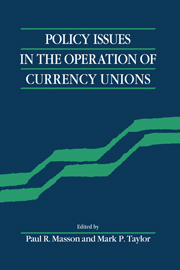Preface
Published online by Cambridge University Press: 04 August 2010
Summary
Currency unions, or single currency areas, is a topic upon which both academics and policy-makers are now focusing a great deal of attention. This has perhaps been most marked in western Europe, given the immediacy of the prospects for Economic and Monetary Union (EMU) among European community countries. In parallel with the movement toward EMU, however, has come the unification of Germany, other major political and economic developments in central and eastern Europe, and increased economic integration in North America. These developments have naturally brought the issue of currency unification – or diversification – to the forefront.
It is in this context that a timely assessment and critique of the literature on common currency areas is needed, and this book provides a collection of recent research by leading scholars in this field.
The book is divided into four parts. The first part provides an assessment of the literature, while later parts look at existing currency unions, the issue of whether or not Europe is an optimum currency area, and the prospects for the establishment and operation of European Monetary Union in the wake of the Maastricht agreement of December 1991.
The opening chapter of the book, by Paul Masson and Mark Taylor, provides an overview and critical analysis of the currency union literature, focusing on a discussion of the conditions under which currency unions would be desirable and viable. Masson and Taylor discuss the empirical work – as well as presenting some new evidence – relating to the operation of existing currency unions in federal states and among regional country groupings.
Information
- Type
- Chapter
- Information
- Policy Issues in the Operation of Currency Unions , pp. xi - xivPublisher: Cambridge University PressPrint publication year: 1993
